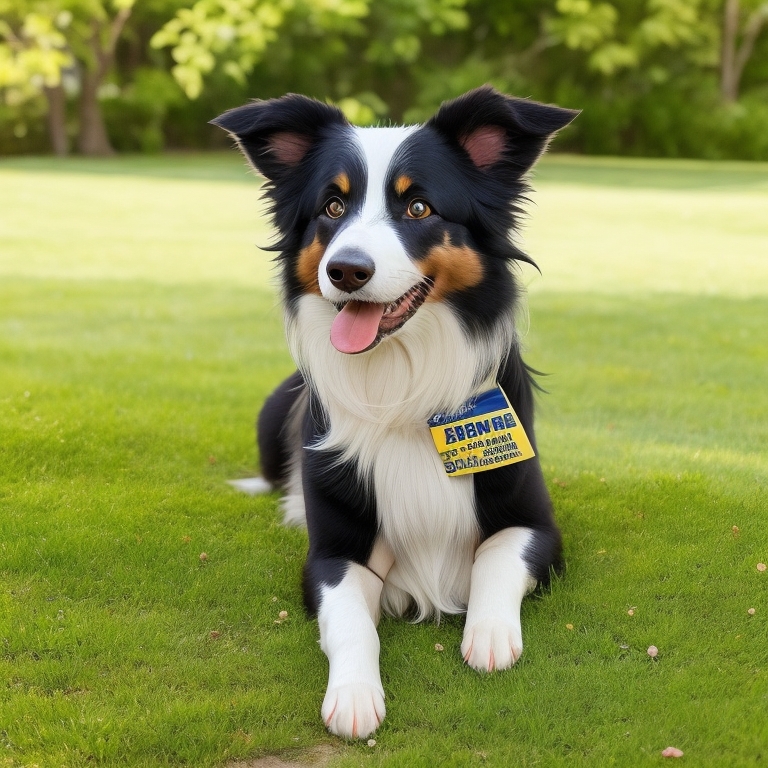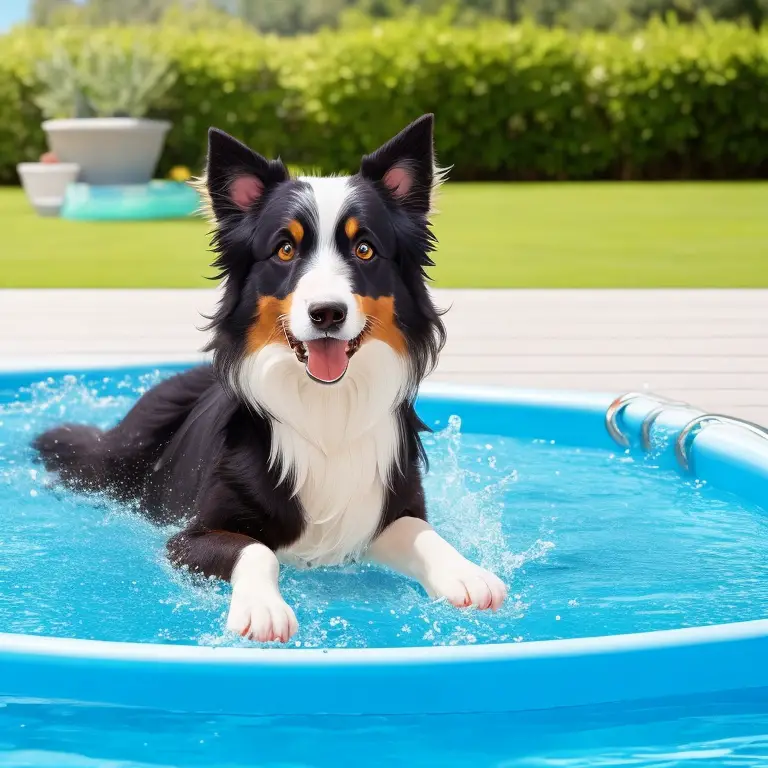Are Border Collies Suitable For Homes With Allergy Sufferers?
Let’s talk about the furry and agile Border Collies, but with a twist. Are they suitable for homes with allergy sufferers?
Whether you’re thinking of bringing home a Border Collie or have one already, dealing with allergies can be a real challenge.
In this article, we will discuss the characteristics of these highly energetic dogs and the ins and outs of allergies. Moreover, we’ll also provide you with some considerations for allergy sufferers, grooming and training tips for Border Collies, and how to prepare your home for your furry friend.
So, let’s get started!
| Factors | Border Collies |
|---|---|
| Hypoallergenic Coat | No |
| Shedding | High |
| Allergy Triggers | Dander and Saliva |
| Grooming Needs | High |
| Exercise Requirements | High |
| Temperament | Loyal, Energetic, Intelligent |
Border Collies and Allergies
Understanding Allergies
Allergies occur when the body’s immune system reacts to a foreign substance that is normally harmless, such as pet dander or pollen. Allergic reactions can range from mild symptoms, like sneezing or a runny nose, to severe reactions, like anaphylaxis.
People who suffer from allergies may experience symptoms like respiratory distress, skin rashes, or digestive issues.
It is important to understand that allergies are not caused by the pet’s hair shedding but by the protein found in their dander, saliva, and urine.

Characteristics of Border Collies
Border Collies are known for their high energy level, intelligence, and loyalty. They are a medium-sized breed, typically weighing between 30 and 45 pounds.
They have a thick, double-layered coat that requires regular brushing to prevent matting and tangling.
The coat sheds moderately throughout the year and heavily twice a year during seasonal changes. Border Collies are also known for being highly trainable and obedient.
They thrive on exercise, mental stimulation, and interaction with their owner.
They are an active breed and require lots of daily exercise to prevent destructive behavior from boredom. However, they can also be sensitive and may require patience and positive reinforcement during training.
Border Collies are also prone to separation anxiety if left alone for long periods.
Overall, if you are considering a Border Collie as a pet and have allergies, it is important to understand their characteristics, such as their energy level and coat, to determine if they are suitable for your home.
Considerations for Allergy Sufferers
If you or someone in your household suffers from allergies, it’s important to consider certain factors before bringing a Border Collie into your home. Here are some key considerations for allergy sufferers:
- Border Collies shed a lot: This breed is known for shedding heavily, which can exacerbate allergies. If you or a family member suffers from allergies, you will need to be extra vigilant about cleaning up after your Border Collie and minimizing contact with pet hair.
- Allergies may vary: Not everyone who is allergic to dogs will have the same response to a Border Collie. Some individuals may be more sensitive to this breed, while others may experience milder symptoms. It’s important to talk to an allergist before bringing a Border Collie into your home to gauge your individual level of sensitivity.
- Consider non-allergenic breeds: If allergies are a major concern, you may want to consider adopting a non-allergenic breed of dog, such as a poodle or a Bichon Frise. These breeds have hair instead of fur, which can minimize allergic reactions.
- Stay vigilant: No matter what breed of dog you choose, it’s important to stay vigilant about cleaning your home and minimizing pet hair and dander. This may mean vacuuming more frequently, washing your dog’s bedding regularly, and keeping your home well-ventilated.
By taking these considerations into account, you can make an informed decision about whether a Border Collie is the right pet for your home.
Ways to Minimize Allergic Reactions
Let’s talk about ways to minimize allergic reactions if you have a Border Collie in your home. Here are some simple tips to help:
- Brush your Border Collie regularly to prevent loose hair and dander from filling the air in your home. Use a brush specifically designed to remove loose hair and dander, and do it outside if possible.
- Bathe your Border Collie frequently to keep their coat clean and reduce the amount of allergens they may carry. Use a hypoallergenic shampoo and rinse them thoroughly.
- Vacuum your home frequently using a vacuum with a HEPA filter to remove any loose hair, dander, and other allergens from carpet and upholstery.
- Wash your dog’s bedding and toys frequently to keep them clean and allergen-free.
- Keep your home well-ventilated to reduce the buildup of allergens in the air.
- Use an air purifier with a HEPA filter to remove allergens from the air.
By following these simple tips, you can greatly reduce the likelihood of allergic reactions if you have a Border Collie in your home.

Alternatives to Border Collies for Allergy Sufferers
If you or someone in your household suffers from allergies, you might want to consider a different breed of dog that sheds less and produces fewer allergens. Here are some alternative breeds to Border Collies for allergy sufferers:
- Poodle – Poodles are one of the most popular hypoallergenic dog breeds because they have hair instead of fur, which means they shed less and produce fewer allergens.
- Bichon Frise – Another hypoallergenic breed, the Bichon Frise is a small and friendly dog that typically does not cause an allergic reaction in most people.
- Maltese – Maltese dogs are also hypoallergenic and have hair instead of fur, which makes them a great option for people with allergies.
- Portuguese Water Dog – Portuguese Water Dogs have a curly, non-shedding coat that produces fewer allergens and are known for their intelligence and trainability.
- Schnauzer – Schnauzers have a wiry, non-shedding coat that requires regular grooming but tends to produce fewer allergens than other breeds.
Remember, before choosing a new dog, it’s important to spend time with the breed to see if you or your family member has an allergic reaction. Consulting with an allergist and breeder can also provide additional insight and opportunities to manage allergies.
Training and Grooming Border Collies
Training Tips for Border Collies
If you’re considering getting a Border Collie, it’s essential to know that this breed requires a lot of training. Here are some tips that can help you train your Border Collie:
- Start Early: Start training your Border Collie as early as possible. Puppies are more receptive to learning at a young age, and it can also prevent any unwanted behaviors from developing.
- Consistency: Be consistent with your training, use the same commands, and ensure that your Border Collie is clear on what you want them to do.
- Positive Reinforcement: Use positive reinforcement techniques such as treats, praise, and games to encourage good behavior.
- Socialization: It’s crucial to socialize your Border Collie from an early age. Ensure that they are comfortable around people, other dogs, and different environments.
- Exercise: Border Collies are active dogs that need plenty of exercise to be happy and healthy. Exercise can also provide an outlet for their energy, which can prevent destructive behavior.
Remember that Border Collies are highly intelligent dogs that thrive on mental stimulation. Training can be an excellent way to provide this stimulation for your furry friend.

Grooming Tips for Border Collies
Grooming is an essential factor in keeping your Border Collie healthy and comfortable, regardless of whether anyone in your home has allergies. However, it is especially crucial for allergy sufferers as regular grooming helps to minimize dander, dust, and other allergens.
Here are some grooming tips to consider:
- Brush your Border Collie’s coat regularly to prevent matting and tangling. A slicker brush and a metal comb can help you achieve this.
- Trim the hair around your Collie’s ears and paws regularly to prevent matting and to keep them clean. This can be done with scissors or clippers.
- Give your Collie a bath as needed, but not too often. Bathing too frequently can strip the coat of its natural oils. Use a mild dog shampoo and make sure to rinse thoroughly.
- Clean your Collie’s ears once a week with a gentle ear cleaning solution to prevent ear infections.
- Trim your Collie’s nails every few weeks to prevent overgrowth, which can cause discomfort and pain.
Although grooming is a key aspect of keeping your Border Collie healthy, it can pose risks, such as skin irritation and cuts. To mitigate these risks, consider grooming your dog in a well-lit area, use sharp and clean tools, and be gentle when handling your Collie.
By following these grooming tips, you can keep your Border Collie healthy and happy while minimizing the risk of allergic reactions in your home.
Potential Risks of Grooming
When it comes to grooming Border Collies, there are a few potential risks to be aware of. Some common issues include:
- Skin irritation: Over-grooming or using harsh chemicals can lead to skin irritation and dermatitis. It’s essential to use gentle products made specifically for dogs.
- Ear infections: Water and soap may get inside the ears during bathing and cause infection. To prevent this, make sure to dry your Border Collie’s ears thoroughly after bathing.
- Nail trimming accidents: Cutting your dog’s nails too short can result in bleeding and pain. Be cautious when trimming their nails, or consider taking them to a professional groomer.
- Eye irritation: When trimming the hair around the eyes, there is a risk of getting hair clippings in the eyes, which can lead to irritation. Be careful when trimming around the eye area and use scissors with rounded tips.
Overall, grooming your Border Collie should be a positive experience for both you and your furry friend. To minimize these risks, make sure to use appropriate grooming products, be cautious when trimming nails, and take your time to ensure a safe and comfortable experience for your dog.
Preparing Your Home for a Border Collie
Home Considerations
When preparing your home for a Border Collie, there are a few important considerations to keep in mind if you or someone in your household suffers from allergies. Here are some tips to help minimize allergens in your home:
- Keep your home clean: Regularly vacuuming and dusting your home can help reduce allergens. Use a vacuum with a HEPA filter to trap pet hair and dander.
- Reduce clutter: Clutter in your home can trap allergens, so try to keep your living space clear and clutter-free.
- Designate pet-free areas: Consider creating a pet-free zone in your home where allergy sufferers can go to escape any potential allergens.
- Wash bedding and fabrics regularly: Bedding, curtains, and other fabrics can collect pet hair and dander, so it is important to wash them regularly.
- Air purifiers: Consider investing in an air purifier to help reduce allergens in the air.
By implementing these simple tips, you can help minimize the impact of allergies on your home while still enjoying the companionship of a Border Collie!
Supplies You Will Need
When preparing your home for a Border Collie, there are certain supplies you will need to ensure your new pet is happy and comfortable. Here are the essential supplies you’ll need:
- Bedding: A comfortable bed for your dog to sleep in is a must. Choose a bed made of hypoallergenic materials to minimize allergic reactions.
- Bowls: You’ll need a food bowl and a water bowl for your Border Collie. Choose bowls made of stainless steel or ceramic to reduce the risk of allergic reactions.
- Food: Opt for high-quality dog food that is free of grains, artificial preservatives, and fillers to minimize allergic reactions. You may also need to consider a special diet for your Border Collie if they have food sensitivities.
- Toys: Border Collies are active dogs that need plenty of exercise and mental stimulation. Invest in toys that are durable and safe for your dog to play with.
- Leash and Collar: A sturdy leash and collar are necessary for taking your Border Collie on walks or outdoor activities.
By having these supplies ready, you can ensure your Border Collie’s transition into your home is as smooth as possible and will keep your home allergy-friendly at the same time.

Making Your Home Allergy-Friendly
If you or someone in your home suffers from allergies, it’s essential to take steps to make your home as allergy-friendly as possible. This is especially important if you plan to bring a Border Collie into your home.
Here are some tips to help you make your home allergy-friendly:
- Invest in a good air purifier: Indoor air quality can be a major trigger for allergies. An air purifier can help remove allergens from the air, such as pet dander, dust, and pollen.
- Choose the right flooring: Carpet can trap allergens, so it’s best to opt for hard flooring surfaces like tile, hardwood, or vinyl. If you do choose carpet, make sure to vacuum regularly and steam clean it often to keep it free of allergens.
- Keep the house clean: Regular cleaning is essential to keep your home free of allergens. Use a HEPA filter vacuum to clean floors, furniture, and curtains, and dust surfaces regularly with a damp cloth.
- Choose hypoallergenic bedding: Your pet’s bedding can also harbor allergens, so it’s best to choose materials that are hypoallergenic and easy to wash, such as cotton.
- Limit pet access to allergen-prone areas: Consider keeping your pet out of bedrooms to reduce exposure to allergens.
By taking these steps, you can help create a more allergy-friendly environment for you and your family, even with a Border Collie in the house.
Conclusion
Border Collies can be wonderful pets for families, but it’s important to consider the implications for allergy sufferers. Understanding allergies and the characteristics of Border Collies can help families make informed decisions.
If you decide that a Border Collie is right for your home, there are ways to minimize allergic reactions through proper training, grooming, and home preparation.
However, if allergies are severe, or if you’re not willing to commit to the necessary steps, it may be better to consider an alternative pet. By making an informed decision and taking the necessary precautions, families can enjoy the companionship of a happy and healthy Border Collie while keeping allergy symptoms at bay.







